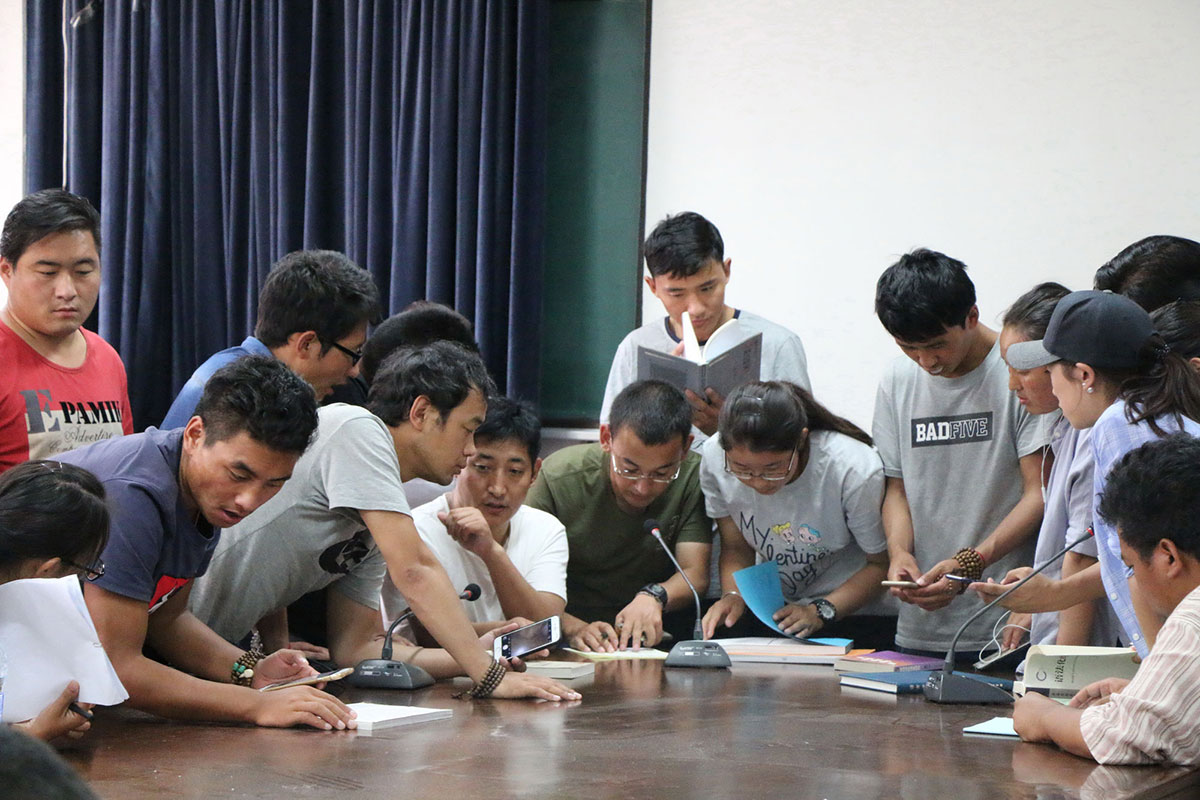In partnership with Nankai University, the Smithsonian Center for Folklife and Cultural Heritage has launched a new web resource to highlight the ongoing work of the Sino-Tibetan Language and Linguistics Summer Institute. The page provides materials developed over the past five years of training workshops and essential educational opportunities for Tibetan community language practitioners in China.
Since 2016, the Center’s Language Vitality Initiative (LVI) has supported the planning, development, and hosting of the Sino-Tibetan Language and Linguistic Research Methodology Workshop through a formal memorandum of understanding with Nankai University in Tianjin, China. Building on this valuable partnership, the resource makes accessible the work of the biennial workshops—which set the foundation for collaborative workshop partners to develop semiformal trainings in linguistics and ethnographic field methods, promote academic and educational exchanges, facilitate research, and provide access to expertise and publication opportunities.
“The partnership has built such a rich collection of teaching materials from past workshops that we felt should be shared with a larger audience,” says Mary Linn, Folklife curator and co-director of the workshop. “Many students cannot make it to the workshops in person. LVI is happy that these materials can help introduce young people in China to much of the workshop content and inspire them to become engaged with their languages.”
Across the first five iterations of the of institute, the Sino-Tibetan Language and Linguistic Research Methodology Workshop has served 183 students from seven minority ethnicities. The transpacific relationship fostered between the Center and Nankai University has proven to be a successful model of training students who would otherwise not have access to language and cultural documentation processes and best practices. As one student of the in-person workshops commented, “We gained knowledge, but even more, we were encouraged and affirmed.”
By providing lectures, handouts, and course slides online for free download, the partners intend to grow the audience of these workshops while also providing additional resources to those who have participated in the past.
“At the same time, the website continues to link international and Chinese faculty with workshop students, and strengthens the tripartite exchange and cooperation between local language communities, workshop students, and universities,” says Yeshes Vodgsal Atshogs, Nankai University professor and workshop co-director.
Continuing the Center’s ongoing commitment to fostering cultural diversity, the Language Vitality Initiative and Nankai University aim to promote language sustainability while supporting speakers and young scholars from language communities to engage in and benefit from the research, documentation, and use of languages and language sustainability.
About Nankai University’s Sino-Tibetan Language Research Methodology Workshop and Tibetan Language Linguistics Forum
Nankai University has a long history of conducting linguistic field research in minority communities of China and an established track record of supporting linguistic researchers from these same communities, dating back to the late 1930s. For ten years, the faculty of the NKU Department of Literature has provided a one-year training program to master’s students of Tibetan linguistics at some universities in western China, including Qinghai Nationalities University and Qinghai Normal University. Program alumni have gone on to attend PhD programs, teach at universities, and hold positions at the Sichuan Radio and Television and the Hainan Prefecture Language Commission.
About the Language Vitality Initiative
With Indigenous and minoritized languages under threat, the Smithsonian Center for Folklife and Cultural Heritage’s Language Vitality Initiative supports community-driven language reclamation efforts. Our research promotes language use in new and traditional contexts and strengthens engagement in cultural heritage wellness.
We work with digital and emerging media to promote unique voices and worldviews. We seek to educate new generations of community language practitioners and linguists through informal and formal workshops and institutes. All our work is used to educate majority-language users about the benefits of living in a multilingual world.
本中心与南开大学合作推出在线专题,提供民族语调查研究课程资源
史密森尼学会民俗与文化遗产中心(the Smithsonian Center for Folklife and Cultural Heritage,CFCH),与中国南开大学(Nankai University, NKU)合作推出了一个专题网页,对持续进行中的“汉藏语言和语言学暑期学苑”(Sino-Tibetan Language and Linguistics Summer Institute, STLLSI)的工作进行重点介绍(“暑期学苑”项目包括开展暑期讲习工作坊和举办学术研讨会)。该网页不但发布了过去五年中“暑期学苑”所形成的学术资源,也为中国民族语言社区研究者提供了基本教学内容。
自2016年以来,本中心的“语言活力计划” (Language Vitality Initiative, LVI),通过与南开大学签订正式的合作谅解备忘录,开始了“汉藏语研究方法工作坊”(Sino-Tibetan Language and Linguistic Research Methodology Workshop, STLLRMW),以及嵌套进行的全国“藏语语言学研讨会”(Tibetan Language Linguistics Forum, TLLF)的规划、创办和持续举办。网页的建设进一步展示了史密森尼学会民俗与文化遗产中心(CFCH)与南开大学(NKU)在这种宝贵的合作关系基础上,每届工作坊的工作内容。这个工作坊提供了语言学和民族学的田野工作方法的培训,促进了学术和教育的交流,推动了相关学术研究,提供了接近语言学专业知识与文献的机会。
“过去几年来,双方合作通过工作坊积累了如此丰富的教学材料,我们认为应该与更多的人分享,”本中心文化和语言复兴馆馆长、工作坊共同负责人Mary Linn说,“很多学生无法亲身到工作坊学习,很高兴‘语言活力计划’(LVI)的这些材料可以给青年朋友介绍工作坊(STLLRMW)的主要内容,并激励他们投身到这些语言保护与研究中。”
通过连续五年“暑期学苑”(STLLSI)的运行,“汉藏语言和语言学研究方法工作坊”已经为183名从事民族语研究的学员提供了教学服务,这些学员覆盖了7个中国少数民族和从事民族语研究的汉族。事实证明,本中心与南开大学之间建立的跨太平洋合作关系是一个成功的培训模式,使得这些学员获得语言和文化记录的规范训练和最佳的实践机会。正如一位参加工作坊的学员所说:“我们获得了知识,同时也获得了很大的鼓励与肯定。”
从网页上可以免费下载历届工作坊的讲座、讲义和课程幻灯片,合作双方打算以此扩大工作坊的培训受众范围,同时也为历届工作坊学员提供额外的教学资源。
“网页同时可以成为‘工作坊’教员及国际国内相关语言学专家,与濒危语言社区,还有‘工作坊’学员三方之间继续交流与合作的纽带,让地方语言社区、学员与高校的联系更密切。”南开大学教授、工作坊共同负责人意西微萨·阿错说。
延续本中心对促进文化多样性的承诺,“语言活力倡议”和南开大学合作旨在促进保护语言资源的可持续性发展,同时支持来自当地语言社区的母语者和年轻学者,参与并受益于语言的记录、研究,以及语言的使用和可持续性发展。
关于南开大学与“汉藏语工作坊”和“藏语语言学研讨会”
南开大学从事中国少数民族语言研究可以追溯到1930年代末,具有悠久的历史,同时在培养和支持少数民族语言学者方面有着优良的传统。中国的若干少数民族,包括傣、藏、彝、拉祜、景颇、黎、瑶等民族的第一个语言学博士均出自南开大学。本世纪初,南开大学中文系,又为中国西部的一些大学,包括青海民族大学和青海师范大学的藏语语言文字学的硕士生,提供每届为期一年的培训。经过十年,通过该培训的校友中,有的进一步攻读语言学博士;有的已经在重要高校,如西北民族大学、青海师范大学、青海民族大学任教从事语言学研究和教学工作;有的在政府广播电视台和地方政府语言文字委员会等机构从事民族语言相关工作。
2016开始,南开大学与史密森尼学会合作,开始举办两年制的“汉藏语研究方法工作坊”,并同时并行举办全国“藏语语言学研讨会”。
关于语言活力计划(Language Vitality Initiative)
面对全球性的原住民和少数民族语言所面临的危机,史密森尼民俗和文化遗产中心(CFCH)开始了“语言活力计划”(LVI),推进社区驱动的语言保护工作。我们的研究促进了语言在传统和新环境中的使用,支持人们努力参与到文化遗产健康发展的保护工作中去。
我们与数字媒体和新兴媒体合作,支持那些独特的声音和文化观念。我们寻求通过正式与其他形式的工作坊和研讨会,助力新一代的语言社区研究者和语言学家的成长。我们的所有工作,同时也是用来帮助大语种语言的使用者,让大家了解生活在一个多语世界中的益处。


